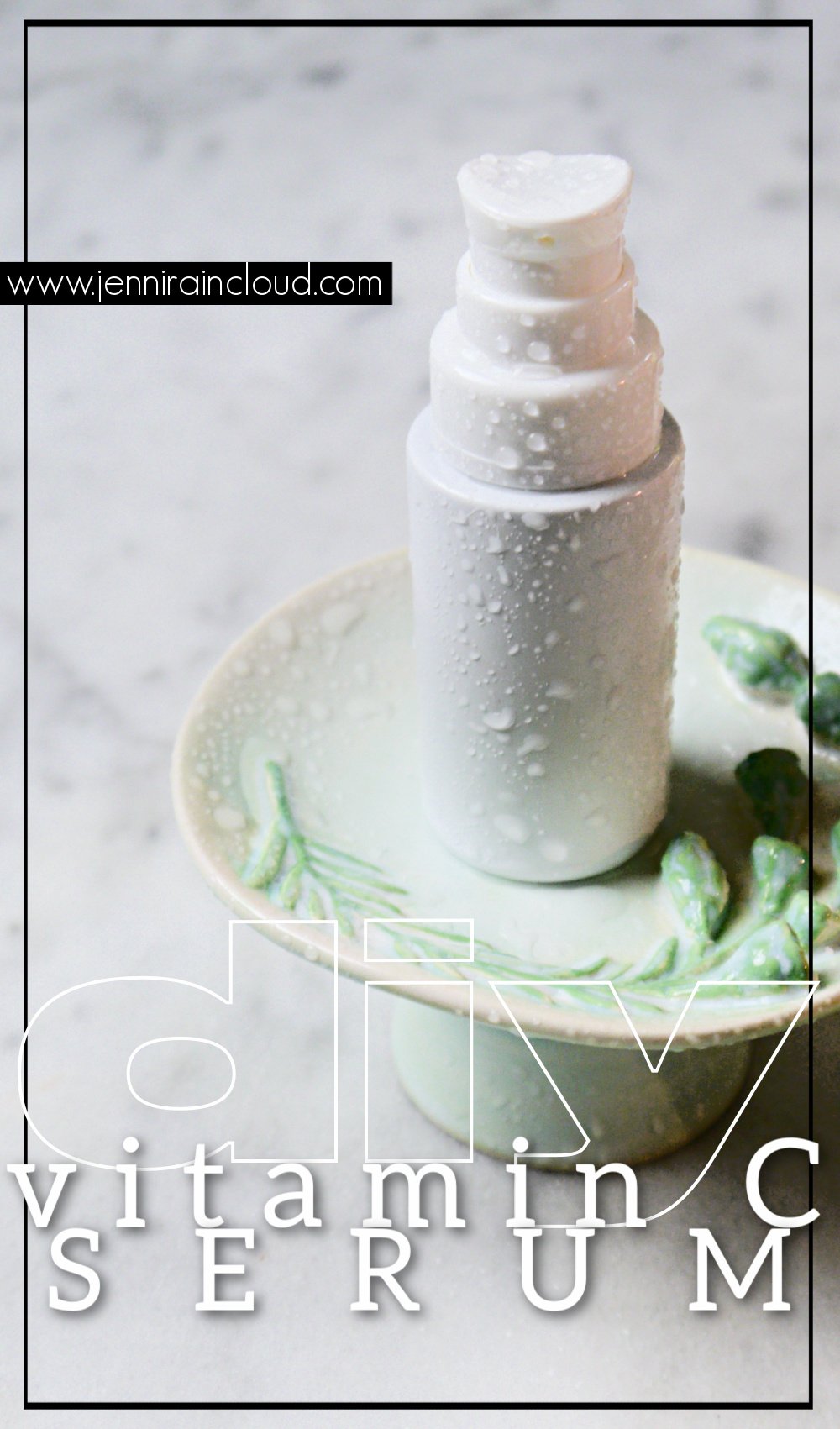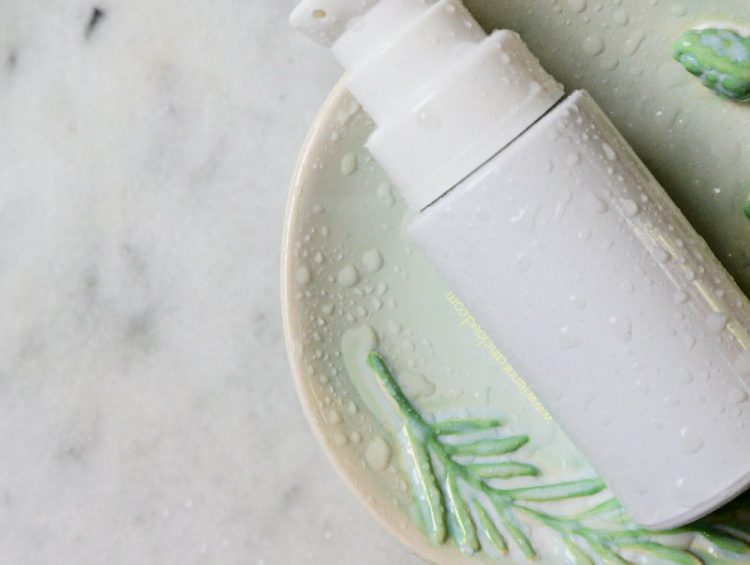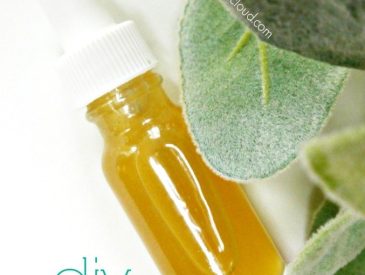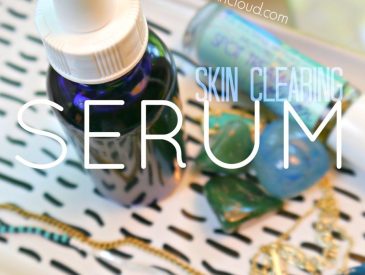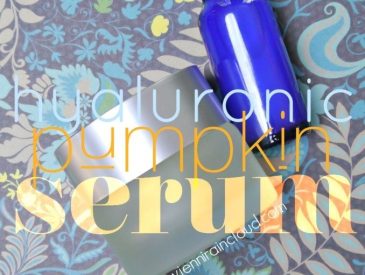Jump to RecipeIn the skin care world, Vitamin C serums are powerful anti aging tools that have been known to smooth and even skin tone, fade sun spots and boost the natural glow of skin. With all these benefits it seems like being able to make an effective vitamin C serum at home is too good to be true but luckily it’s not as long as you know how to properly make it! Read on to find out how easy it is to take charge of your skin!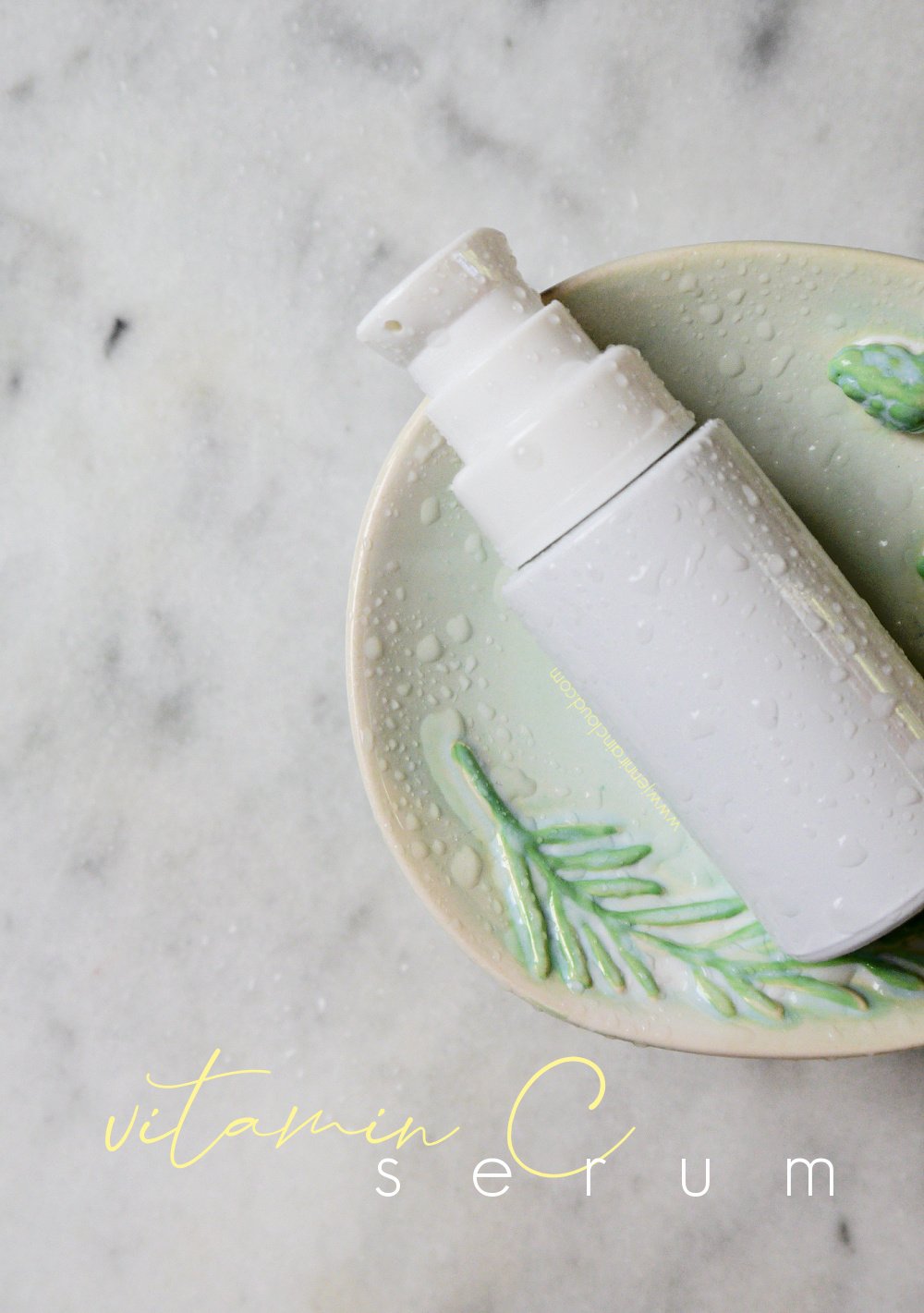
Disclosure: This post contains affiliate links, meaning, at no additional cost to you, I will earn a small commission if you click through and make a purchase. Learn more
Topical vitamin C is possibly the most effective anti aging ingredient you can use. It promotes collagen synthesis, fades hyperpigmentation and is a powerful antioxidant! This super simple homemade Vitamin C Serum recipe has easy to find ingredients that are going to give your skin that boost you’re looking for for little effort and little money! This DIY serum can improve skin health dramatically with regular use and making sure your serum is at it’s upmost freshness.
Benefits of Vitamin C Serum:
- Encourages the production of collagen. As we age, our collagen levels dramatically drop, therefore collagen production slows. Collagen is a protein that makes the skin have elasticity which keeps fine lines and wrinkles from forming.
- Has the ability to correct hyperpigmentation from UV damage
- Protects against dark spots caused by sun damage
- Powerful antioxidant which means it fights age causing free radicals. It reduces the number of sunburned cells as well as reverses age-related damage to skin.
- Calms inflammation
- Regenerates new skin cells
- Sloughs off dead skin cells
- Improves skin tone and skin texture
- Increases hydration in the skin
- Reduces Redness
- Reduces the appearance of under eye circles.
- Has very mild side effects if any
- Speeds up wound healing
Vitamin C is such an effective ingredient in skin care that I wrote an entire post solely on it’s benefits.
The Problem w/ Store Bought Vitamin C Serums
You can buy a “vitamin C” cream or serum at many drug or department store but what they don’t tell you is that once vitamin C is added to a serum or cream, it loses it’s potency. Vitamin C is incredibly unstable. However, you probably know-this doesn’t stop many skin care companies charging 100s of dollars for a small bottle of vitamin C serum! Not to mention, in order to extend the shelf life, many commercial products contain harmful ingredients like propylene glycol.
This being said, whether you’re a DIYer or not-making your own DIY vitamin C serum is the best way to reap all the incredible benefits of vitamin C. Not to mention-it’s very affordable and takes minutes.
**To boost even more vitamin C in your routine, try out my coQ10 Seabuckthorn face oil. Seabuckthorn is the perfect companion to a vitamin C serum due to it’s extremely high vitamin C content.
Also, check out my Licorice Root Skin Brightening toner recipe for even more sun spot fading action!!
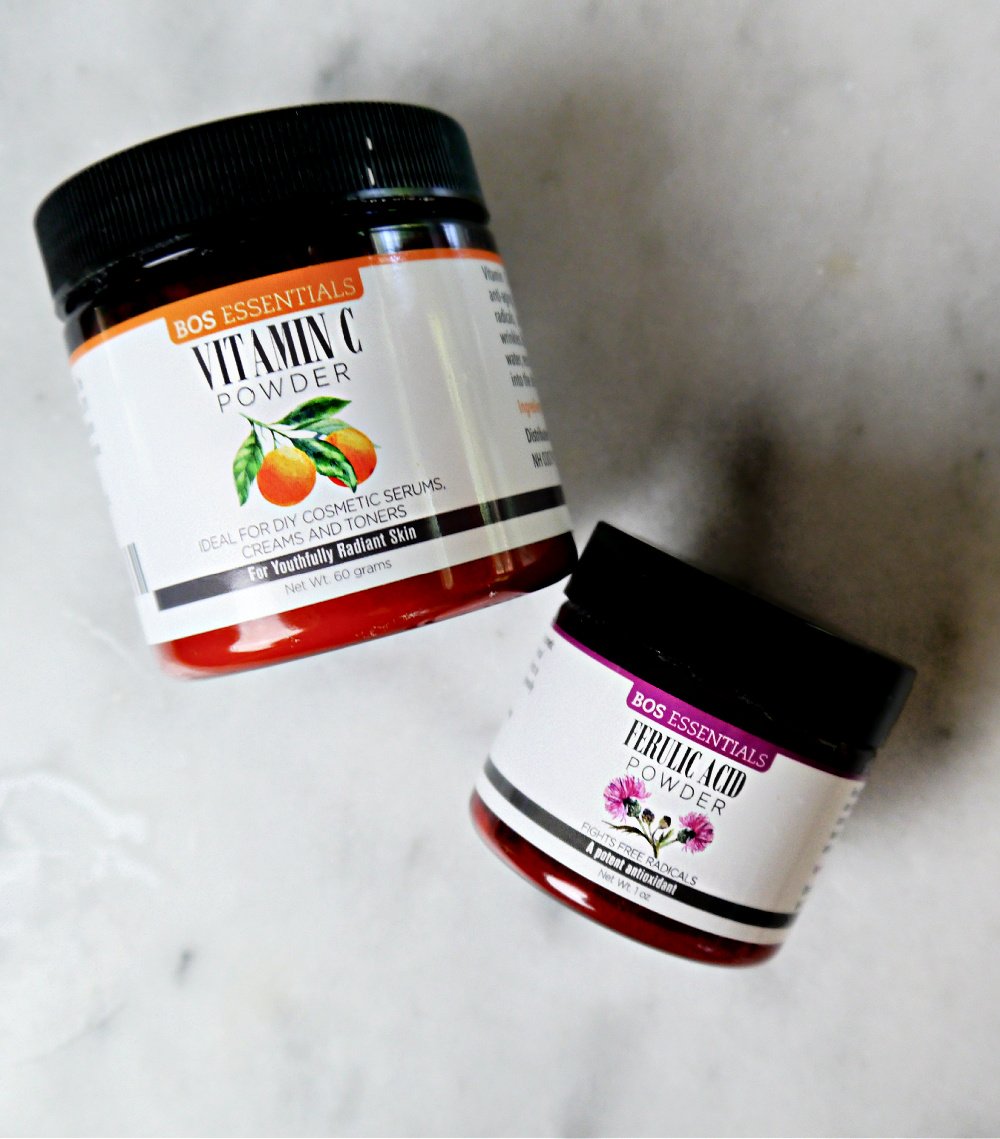
What Can I Mix Vitamin C Powder With?
There are many answers to this question.
You can simply mix your vitamin C powder with distilled water! However, I love to use more nourishing ingredients.
The one rule is that the ingredient you choose needs to be water based not oil based.
Aloe vera gel is a fantastic option for sensitive skin. It is hydrating without being heavy and has loads of skin benefits.
Rose water is another great option. Rose has highly effective properties that can help all skin types. It’s gentle yet can pack a punch when it comes to slowing down the aging process.
Commonly Asked Questions:
Can I use vitamin C tablets to make serum? I have not and don’t recommend it.
What skin types shouldn’t use a homemade vitamin C serum? Sensitive skin types can become irritated. However, adjusting the strength of your vitamin C powder can make it doable.
Can I use lemon juice instead of vitamin C serum? No. lemon juice can cause photosensitivity and will highly irritate the skin.
Can I use aloe vera gel and vitamin C serum together? Absolutely! Aloe is a fantastic ingredient for a vitamin C serum.
Can I mix vitamin C with coconut oil? No, vitamin C powders don’t mix with oil based products.
Will dehydrated orange peels or other citrus fruits work as vitamin C? Maybe. However, there’s no way to know how potent your serum would be. I do love the idea of using dehydrated citrus peels in a cleansing grains recipe!
Can I add Vitamin E Oil to my homemade serum? I don’t recommend it simply because water and oil don’t mix. The vitamin E will set on top of your serum.
DIY Vitamin C Serum Ingredient List:
- Bos Essentials Vitamin C Powder-Not all vitamin C (also known as l-ascorbic acid) are made the same and I can not speak on any other powder than the one I have listed.
- Vegetable Glycerin
- Aloe Vera Gel
- Ferulic Acid Powder *optional
- 1 oz. dark glass bottle (dropper or pump)
- Small Funnel
- Measuring spoons
- pH Strips
Continue to Content
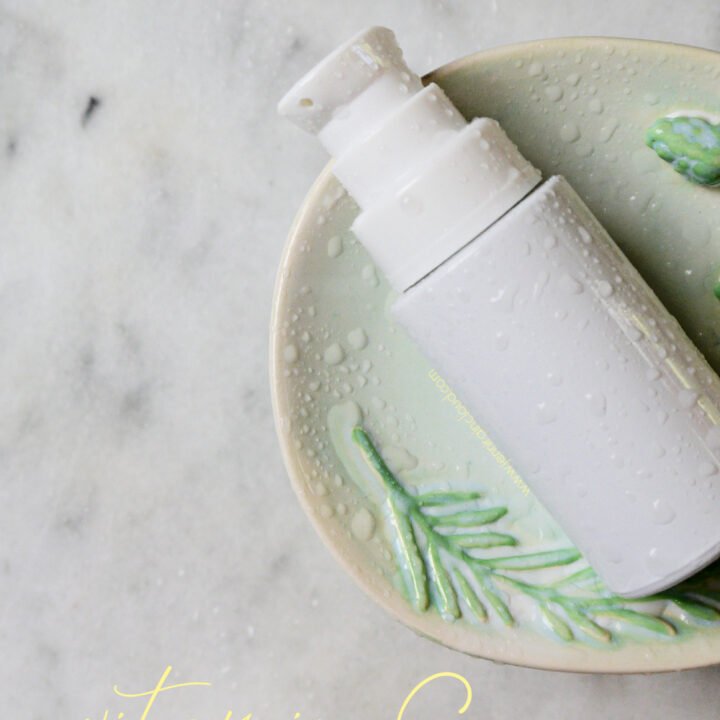
DIY Vitamin C Serum Recipe
Yield: 1 ounce Prep Time: 5 minutes Total Time: 5 minutes
Brighten, tighten and smooth skin with this super easy to make DIY Vitamin C Serum recipe! Vitamin C is possibly the most effective anti aging ingredient you can use. It promotes collagen production, fades hyperpigmentation and is a powerful antioxidant! This super simple serum recipe has easy to find ingredients that are going to give your skin that boost you're looking for for little effort and little money!
Materials
- 1 tsp. Vitamin C Powder
- 1/8 tsp. Ferulic Acid
- 1 tsp. Glycerin
- 2 TBSP. Aloe Vera Gel
Tools
- 1 ounce dark glass bottle
- Small Funnels
- Measuring Spoons
- pH Strips
Instructions
- Mix ingredients in a small bowl until the powder is dissolved.
- Transfer to a 1 ounce dark glass bottle with a small funnel.
- Place your serum in the fridge overnight or at least for a few hours to allow the powder to completely dissolve.
Notes
- It is important to store your DIY Vitamin C Serum in a 1 ounce dark glass dropper bottle or treatment pump. This will help your serum stay effective longer.
- This recipe should be used in no more than 7 days. You must remake your serum weekly. It is some extra work, but trust me, the benefits are worth it.
- Feel free to use this on the backs of your hands as well. As most of us already know, sun spots show up on the hands first.
- Vitamin C can cause your skin to be irritated at first. When you apply it, a small amount of tingling is normal. If it is burning, remove it immediately. Don't worry – you can just add more Aloe Vera Gel to your mixture. This will dilute the Vitamin C so it is more suited for your skin. This recipe makes a little under 1 ounce so you can easily add more to your 1 ounce bottle if you choose.
- An easy way to make sure your Vitamin C is in the perfect form to get the most benefits is by using a pH test strip. Your serum should be right around 3.5.
- Too much glycerin can feel tacky on your skin.
- If you are having trouble with the feeling of this serum, omit the glycerin and add more Aloe Vera Gel. I find that it gives me a very dewy look which I love but I also feel like my hair can get stuck to my face after using the serum.
Did you make this product?
How to Adjust the Strength of Vitamin C Serums:
You can add between one half to two tablespoons of Bos Essentials Vitamin C Powder to four tablespoons liquid.
- ½ tablespoon = approximately a 5% solution
- 1 tablespoon = approximately a 10% solution
- 1 ½ tablespoon = approximately a 15% solution
- 2 tablespoons = approximately a 20% solution
My recipe is a 10% solution. If you would like to increase your percentage, do so cautiously. Vitamin C can burn and irritate the skin.
Bos Essentials Vitamin C Powder is really easy to work with. It’s very powdery rather than grainy. I find that after a few hours it completely dissolves which never happened with any other vitamin C powder I’ve used.
If you want to get really excited about the effectiveness of this powder, read the reviews on Amazon!
Also, this vitamin C powder works great in my DIY Vitamin C mask recipe!
pH and Vitamin C:
pH is important to consider when it comes to a vitamin C serum. Your serum can easily be checked by using a pH strip. Simply drop a drop of your serum onto a pH strip.
We are wanting our serum to be between 3-4.
If you serum is too low, it will irritate your skin and cause more harm than good. If it is too high, it won’t be effective.
You can raise the pH of your serum by adding small amounts of baking soda at a time.
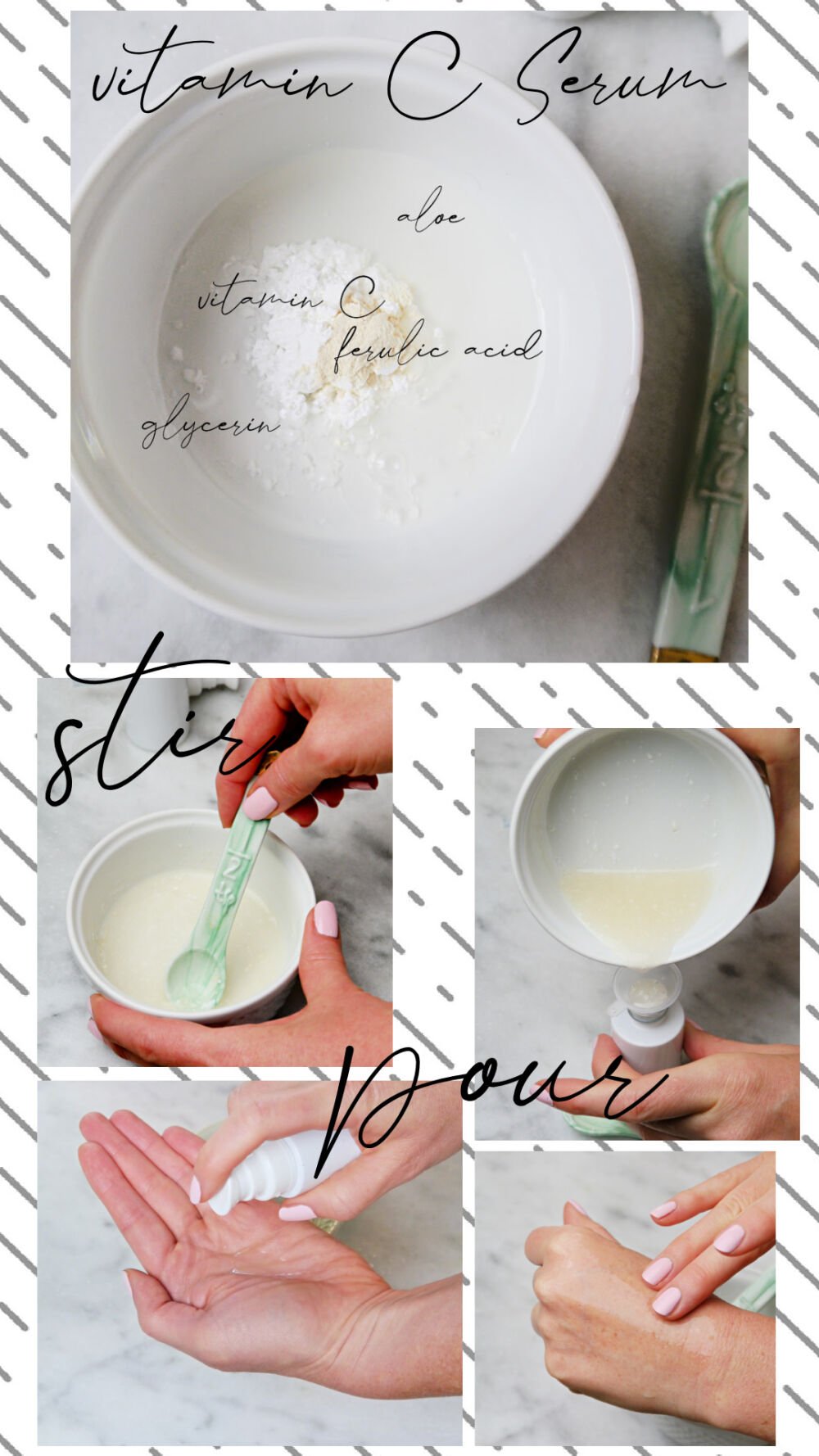
How to Use a DIY Vitamin C Serum:
- Vitamin C serums can be used daily.
- After cleansing and toning your skin, apply a thin layer of vitamin C serum to your skin.
- Allow the serum to penetrate the skin.
- Follow up with a moisturizer-I recommend a face oil like my coQ10 Seabuckthorn face oil.
- Use this serum in the evening unless you are also using a retinol or AHA/BHA.
Precautions When Using a Vitamin C Serum
Vitamin C serums should not be used at the same time as glycolic, salicylic or lactic acids. These AHAs and BHAs will throw off the pH palace and cancel the effect fo vitamin C. Niacinamide could also counteract vitamin C’s benefits.
Retinol should also never be used at the same time as vitamin C.
If your skin can handle using both Vitamin C and the acids mentioned above or retinol, you can use a vitamin C serum in the morning and another acid in the evening.
I recommend using a sunscreen during the day since these products can cause your skin to be extra sensitive to sunlight.
Want More Easy Recipes that Contain Vitamin C?
- DIY Vitamin C Mask
- The Easy Way to Use Vitamin C
- Vitamin C, Aloe & Clay Mask
- DIY Vitamin C Sheet Mask
- DIY Vitamin C Rice Bran Cleansing Grains
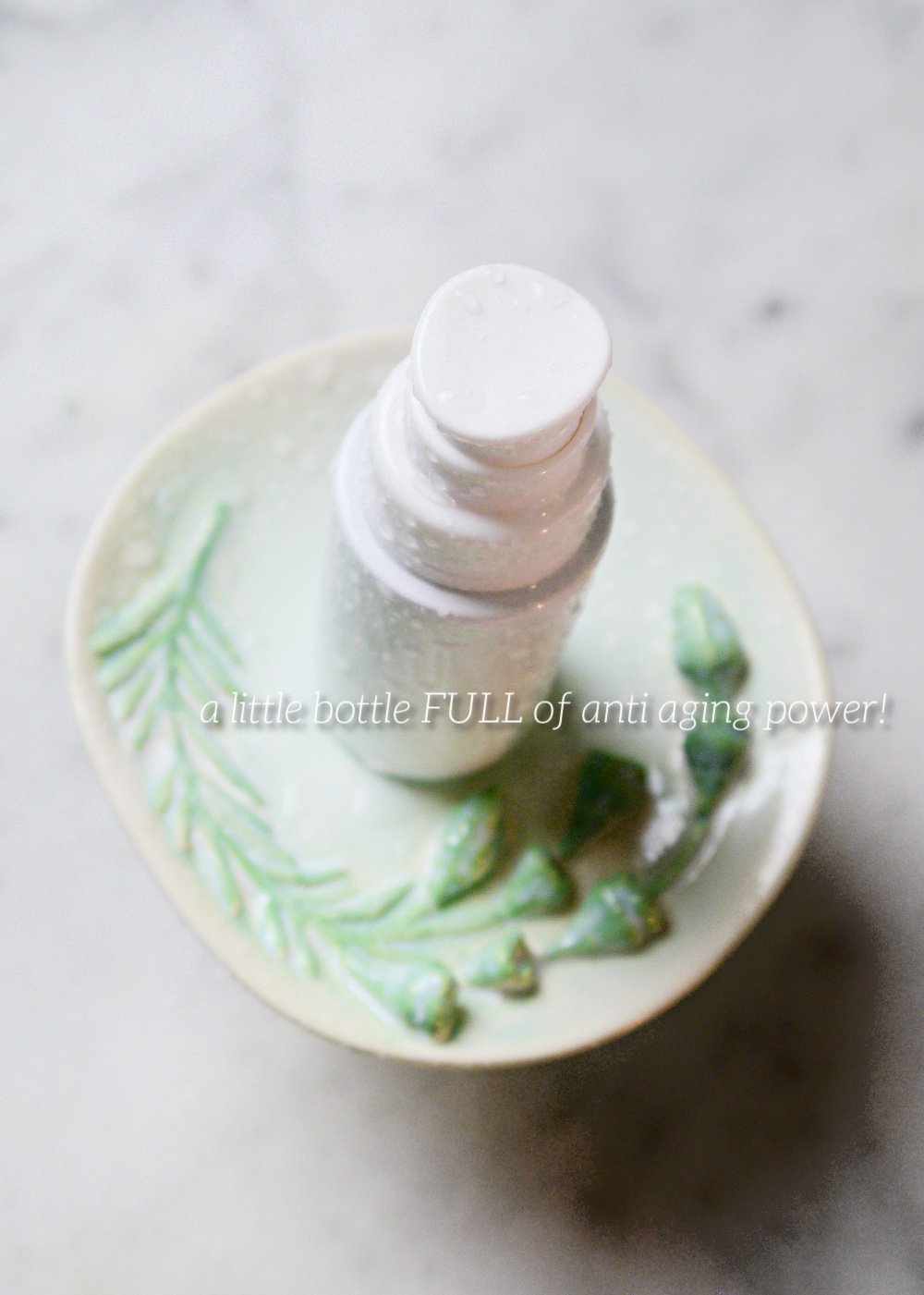
How Often Should You Make A Fresh Batch of Serum?
This recipe should be used in no more than 14 days. You must remake your serum at least every 2 weeks. You might even want to make it weekly since it is so fast and easy. It is some extra work, but trust me, the benefits are worth it. If you don’t make a fresh batch of serum weekly, your serum will oxidize and be useless.
Making a new batch biweekly is a small price to pay for healthy skin! Luckily, this vitamin C serum is an easy recipe and takes minutes to make.
A vitamin C serum will turn yellow once it’s gone bad. Using a dark colored bottle makes it impossible to really tell if your serum is off. I don’t personally do this but you can put your serum in a clear glass bottle and cover it with foil. This way it’s protected but you can still check on it’s color.
Using a skincare fridge can help your vitamin C serum from oxidizing as quickly.
A preservative is not necessary since we are making fresh batches weekly. Plus, a low pH makes it hard for bacteria to proliferate.
I love using this natural vitamin c serum for several reasons. The biggest reason is that it is so effective and results can often be seen quickly. I also love that how soft my skin is upon just one use. Plus, after using a vitamin C mask or the vitamin C serum, my skin sucks up my facial oils.
It can take 4-12 weeks to see results after regularly using vitamin C. However, immediate results are often seen such as brightening, smoothing and hydrating!
The original recipe is on the Primally Inspired blog. However, it has taken much time and much research to perfect this recipe so it was necessary to write this new and improved update.
xx, Jenni
PIN IT!!!
